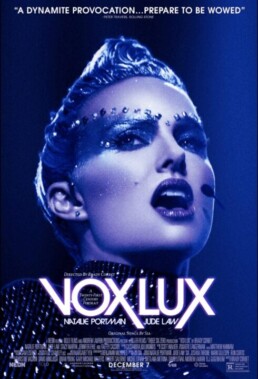‘Vox Lux’ Review: Pop Goes the World
This relationship between the artificiality of pop music and the culture that empowers it is what director Brady Corbet explores in his new movie.
Listening to pop songs brings about a rush of feel-good happiness to listeners, but when thinking of it as an engineered product of an industry, it might also be seen as a highly-concentrated construction of fantasy for consumers to buy into for momentary escape. This relationship between the artificiality of pop music and the culture that empowers it is what director Brady Corbet explores in his new movie Vox Lux, a fictional portrait of a pop star set in modern America. With bold and unflinching storytelling, as well as mesmerizing visuals and performances, Vox Lux is one of the most powerful films I’ve seen this year.
A pop portrait with an inventive structure
Vox Lux is a portrait of the rise of a pop star, but that’s largely just the story that allows the movie to mirror this twenty-first-century America where entertainment, image, and pop culture hold all value. Vox Lux has a storybook-like quality, where meta elements such as its three-chapter structure and omniscient narration by Willem Dafoe give it lyrical quality, but that also includes its significantly darker tone (which audiences should brace themselves for as seen in the film’s opening sequences).
Our future pop star – young Celeste (Raffey Cassidy) – was born from darkness. After being the sole survivor of a horrific deadly rampage, the soft-spoken New Jersey native is thrust into the national spotlight as the face of a nation’s sorrow and strength. Poised and collected, we see that Celeste not only has words of honest strength to share, but music in her heart as well, and an original song co-written by her sister Eleanor (Stacy Martin) soon becomes a national anthem to a grieving and shaken country. With the guidance of a new manager (Jude Law), Celeste and her sister are introduced to a whole new world of entertainment and all that it brings.
Natalie Portman is transfixing
We see young Celeste go through the ropes – recording in the studio, dealing with her publicist (Jennifer Ehle), and further entrenching herself in the debauchery of the industry, but it’s when Vox Lux jumps years ahead that we find present-day Celeste (Natalie Portman), no longer a novice of the pop music machine but now its biggest superstar. Although years have passed, the film plants us back into the present day on the day of another horrific rampage, sending a tour-bound Celeste back into national headlines through comments to reporters (Christopher Abbott). We’ve seen Natalie Portman embrace against-type roles before including her Best Actress award-winning performance in Black Swan, but in Vox Lux she is a full-on diva, playing every bit the self-obsessed and drug-dependent celebrity that one can imagine. It’s a terrific performance that sees Portman play the full range of pop stars and should be remembered this Awards season.
Be ready – it’s shocking
Audiences should be warned that Vox Lux depicts horrific events in vivid detail. Rampages with firearms are shocking, but only serve to show what it is that pop music tries to do – which is what young Celeste wisely notes: “I make pop music to make people feel good.”
The film’s original songs were written by Sia
Vox Lux reaches its end and climax with a full-on immersion into rock concert world, not dissimilar to Bohemian Rhapsody. The original music in this concert, as well as throughout the whole song, is done by artist and hit-maker Sia. For a movie that’s about pop music, this movie needed to have good songs, and Sia is great.
Ryan Rojas
Ryan is the editorial manager of Cinemacy, which he co-runs with his older sister, Morgan. Ryan is a member of the Hollywood Critics Association. Ryan's favorite films include 2001: A Space Odyssey, The Social Network, and The Master.


